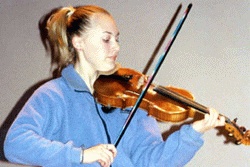After a while we wander back to where Denise is playing. She has been holding down our rented spot selling CDs and playing tunes. I join Denise as Amanda wanders off with some school friends. As the day wears on Denise and I grow weary. Eventually, Amanda returns and Denise talks Amanda into doing a couple of tunes with us. We need the change of pace. Playing as a family trio is a challenge because agreeing on common repertoire is sometimes a problem.
Amanda has established her musical identity apart from her mother's by learning a style of music that's totally different from her mother's. Mom speaks several dialects of music: most notably Celtic, Appalachian and contra dance. Amanda too speaks several dialects but she is best at the Texas contest dialect. This genre is very fiddle-centric music that is a challenge to play on fiddle and almost impossible to play on hammered dulcimer. Making matters worse, Amanda has often admonished Denise when learning any of her tunes. Amanda will say "Mom! That's my tune." Of course it's okay for Dad to play, as long as it's backup guitar. Fiddle, like hammered dulcimer, sounds so much better with backup guitar that stays in the lower pitch range and defines the chord structure. Great backup guitar is not really noticed, but can make the lead instruments sound extraordinarily better. Hammered dulcimer, on the other hand, plays in the same pitch range as fiddle and competes for the spotlight. Thus, common repertoire is difficult to find, but despite this, out of nowhere someone blurts out "Billy in the Lowground" -- a tune we all love, and gallop into at that Texas tempo.
 |
| Amanda Kerr |
 |
Now I can't help but think of John Michaud and how he loves this tune. I wish he were here playing it with us right now. More than once he has been persuaded to stay at a jam session longer than he planned just because everyone would say "John, let's play Billy in the Lowground" as he was about to put his banjo away. "Billy" is one of those tunes that no two people play the same, at least nobody that I know; if they do it's probably an accident. You can play it as a ramble (that's the way I like it); or you can play it fast; or you can play it really fast; or blast it into the stratosphere from a rocket launcher. It's the kind of tune that can be used as a vehicle for expressing the inner soul of man. I have seen it cajole a crowd of people into frenzied dance. You could call this tune versatile and not be accused of lying.




